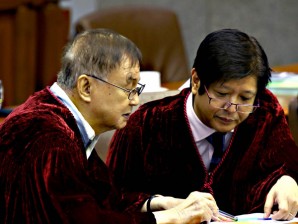Arroyo, Marcos: Aquino administration used ‘naked power’ to secure Corona conviction

Senator judges Joker Arroyo and Ferdinand Marcos Jr. during the impeachment trial of Chief Justice Renato Corona. BERNARD TESTA/ SENATE POOL
Voting to acquit Chief Justice Renato Corona, Senators Joker Arroyo and Ferdinand Marcos Jr. on Tuesday accused the Aquino administration of using its “naked power” and mobilizing all its resources to secure a conviction.
Senator Miriam Defensor-Santiago, in her most strident outburst yet in casting one of three principled votes of not guilty, called on God “to strike me dead,” rather than hear arguments of her colleagues for conviction that Corona dishonestly submitted a statement of assets, liabilities and net worth (SALN).
“Impeachment is a political process, not a political assassination. An impeachment aspires to be a judicial proceeding that makes imperative that it stick to judicial rules. An impeachment must ever uphold the due process that no citizen, high or low, can be denied,” Arroyo said in explaining his vote.
The maverick senator noted that what the House of Representatives initiated against Corona was “not an impeachment” because an impeachment was an “accusation accompanied by necessary formalities, and attended by appropriate solemnities, and flanked by the liberties and guarantees that a genuine grand jury proceeding upholds.”
“The Senate is being asked to remove the Chief Justice from office all because he submitted an allegedly erroneous SALN,” he said. “What has happened is the passage that to which the Senate President once warned: That we’re veering close to a bill of attainder.”
Article continues after this advertisementBill of attainder
Article continues after this advertisementA bill of attainder, he explained, is a law that is submitted by one House and approved by another, “creating an offense where there was none, inventing a crime out of actions, willful or not, that were innocent when they were performed.”
“I can’t imagine removing the Chief Justice on account of the SALN. Today, we’re one step from violating the Constitution and passing a bill of attainder. No one can stop us if we don’t stop ourselves. This is not justice, political or legal. This is certainly not law; for sure it’s not the law of the Constitution. It’s only naked power as it was in 1972,” he said.
“I have not thought I would see it again so brazenly performed but for what it is worth, I cast my vote, if not for innocence falsely accused, of offenses yet to exist and if not for the law and the Constitution that we were privileged to restore under Cory Aquino, then because it is dangerous not to do what is right when soon we shall stand before the Lord,” he added.
Arroyo was the second senator to cast his vote, and the first to vote for Corona’s acquittal.
Marcos asserted that an impeachment trial was “sui generis” and hence, the Bill of Rights “stands supreme” over all government power, including the power to impeach.
“And nowhere is this precept more opposite than in this case, where the government has mustered all the resources at its disposal, not only to secure evidence against the Chief Justice but further to ensure his conviction,” he said.
Questionable evidence
While the evidence presented by the prosecution came from questionable sources, and was “grossly exaggerated,” Corona had “sufficiently addressed” the accusation against him on the filing of his SALN, as well the disclosure of his real properties, peso and dollar accounts, Marcos said.
Marcos said the Chief Justice explained that he was not obliged to declare the deposits under the Foreign Currency Deposit Act (FCDA), and while this interpretation was being criticized as “flawed,” some officials agreed with the chief magistrate’s position.
“In view of the ambiguous situation created by the concurrent application of the 1987 Constitution, the SALN law, and the FCDU (foreign currency deposit unit) law, and absent a determinative judicial pronouncement that resolves the contrary positions on this legal issue, the Chief Justice must be presumed to have acted in good faith,” he said.
By culpable violation, the framers of the Constitution referred to its “willful and intentional violation” while “betrayal of public trust” was a catch-all phrase for acts violative of the oath of office, the senator said.
Both grounds, he added, were contemplated “to exclude unintentional or involuntary violations.” “Granting therefore that the Chief Justice violated the SALN law, this certainly does not rise to the level of an impeachable offense,” he said.
‘Better to die’
Santiago did not miss the last chance to slam the prosecution of having failed to fully understand the confidentiality clause guaranteed by FCDA.
“I was already hoping with all my heart that God would strike me dead! It’s better to die as a lawyer than listen to your arguments,” Santiago said.
Santiago, a former trial court judge, claimed that there was no conflict between the FCDA and the constitutional provision of full disclosure of assets, liabilities and net worth for all public officials.
She described the “perceived conflict” between the two provisions as “so simplistic that it is seriously laughable!”
Alluding to what Jesus Christ said on John 8:7, “he who is without sin, cast the first stone,” Santiago accused the prosecution for pointing an accusing finger at the Chief Justice, when the whole country was actually mired in corruption.
“Why is the Philippines always ranked as one of most corrupt countries in the whole world? Are you pretending to be faultless?” Santiago asked.
‘Hypocritical situation’
“What a hypocritical accusation! That’s a problem with this country! We’re all for honest government, but the world condemns us. We have the reputation of being a corrupt country!” she said, and concluded her virulent speech with a prayer to be given a second life to go after all the crooks in government.
“Lord, give me one more life …, ” Santiago said but she quickly added that she would be willing to investigate herself.